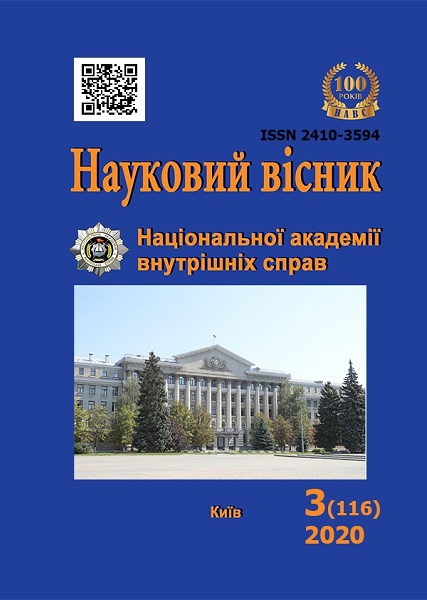Law-Making by International Organizations
Abstract
The purpose and objectives of the article are to: analyze the provisions of soviet and post-soviet international legal doctrine in terms of participation of international organizations in the process of international lawmaking; study of approaches to lawmaking of international organizations, developed in Western jurisprudence. Methodology. On the basis of comparative law, system, epistemological, phenomenological and other methods revealed the features of the legal personality of international organizations, primarily as participants in the international law-making process, the main approaches to their definition, differences in the dimensions of (post) Soviet and Western legal science. Scientific novelty. The ability of an international intergovernmental organization to create domestic law has not always been considered in Soviet and domestic science as evidence of the organization’s participation in the process of international lawmaking. At the same time, in Western doctrine, the law-making of international intergovernmental organizations is mostly interpreted in the light of the theory of the principal-agent and the functional approach. International non-governmental organizations are equally not recognized as direct participants in international lawmaking in both Western and (post) Soviet jurisprudence. Conclusions. The legal personality of modern international intergovernmental organizations demonstrates a number of problematic aspects that require proper study, comprehensive research. Foreign legal scholars pay less attention to the activities of international intergovernmental organizations in the framework of the founding acts and are more positive about leaving them, and in the post-Soviet space the attitude to exceeding the amount of rule-making competence is more critical.
Keywords: international organizations; intergovernmental organizations; non-governmental organizations international law-making; law of international organizations.
Downloads
References
Абашидзе А. Х. Право международных организаций : учебник. М. : Юрайт, 2014. С. 76–99.
Alvarez J. E. International organizations as law-makers. Oxford : OUP, 2006. Р. 120–121.
Bradley C. A., Kelley J.G. The Concept of International Delegation. Law and Contemporary Problems. 2008.
No. 71 (1). Р. 1–36.
Charnovitz S. Nongovernmental Organizations and International Law, 100 Am. J. Int'l L. 348. George Washington University Law School, 2006. Р. 352.
Delegation and agency in international organizations / D. G. Hawkins, D. A. Lake, D. L. Nielson, M. J. Tierney (Eds.). Cambridge : CUP, 2006. Р. 3–38.
Higgins R. The Reformation in International Law, in Law, Society and Economy : book. Oxford, 1997. Р. 211–215.
Hinojosa-Martínez L. The legislative role of the Security Council in its fight against terrorism: legal, political and practical limits. International and Comparative Law Quarterly. 2008. No. 57 (2). Р. 333–359.
Huber J. D., Shipan C. R. Deliberate discretion? The institutional foundations of bureaucratic autonomy. Cambridge : CUP, 2002. P. 27.
Ільницька У. Особливості міжнародно-правової суб’єктності неурядових організацій. Українська національна ідея: реалії та перспективи розвитку. 2012. № 24. С. 84–90.
International court of Justice Reports of Judgements, Advisopy opinions and orders from 1962. P. 168. URL: https://www.icj-cij.org/en/decisions/all/1962/1962/desc.
Johnstone I. Law-Making by International Organizations. Interdisciplinary Perspectives on International Law and International Relations: The State of the Art. / J. Dunoff, M. Pollack (Eds.). Cambridge University Press, 2012. P. 266–292.
Камінська Н., Свєшнікова М. Діяльність міжнародних організацій у сфері забезпечення гендерної рівності. Юридичний часопис Національної академії внутрішніх справ. 2020. № 1 (19). С. 102–109. doi: https://doi.org/10.33270/04201901.102.
Kaminska N., Shpakovich O., Demidenko V. Trends in the Development of International Legal Personality and Subjects of International Law: Theoretical Analysis. OPCION. Universidad del Zulia. 2018. Vol. 34. Nо. 87-2. P. 507–520. URL: https://www.scopus.com/record/display.uri?eid=2s2.085060494215&origin=resultslist&sort=plff&src=s&st1=Trends+in+the+development+of+international+legal+personality%3a+theoretical+analysis&st2=&sid=ad6638de79b74eed02483babfeecc362&sot=b&sdt=b&sl=97&s=TITLEABSKEY%28Trends+in+the+development+of+international+legal+personality%3a+theoretical+analysis%29&relpos=0&citeCnt=0&searchTerm=.
Муфлиханова Д. Р. Компетенция международной организации на примере Организации исламского сотрудничества. Вестник Волжского университета имени В. Н. Татищева. 2012. № 4. С. 1–4.
Пронюк Н. В. Сучасне міжнародне право : навч. посіб. Київ : КНТ, 2010. 280 с.
Ross S. A. The economic theory of agency: the principal’s problem. American Economic Review. 1973. No. 63(2). P. 134–139.
Сахнюк В. Прояв над національності у функціонуванні інституційної системи Європейського Союзу. Підприємництво, господарство і право. 2017. № 4. С. 197–199.
Щербань Є., Камінська Н. Деякі питання імплементації Римського статуту про Міжнародний кримінальний суд. Науковий вісник Національної академії внутрішніх справ. 2020. № 2 (115). С. 138–143. doi: https://doi.org/10.33270/01201152.138.
Шпакович О. М. Право міжнародних організацій : курс лекцій. Київ¨: Ін-т міжнар. відносин, 2020. С. 93.
Тарасова Л. Н. Проблемы правомерности в правотворчестве международных организаций. Исторические, философские, политические и юридические науки, культурология и искусствоведение. Вопросы теории и практики. 2013. № 12 (38). С. 181–185.
Törnquist-Chesnier M. NGO and International Law. Journal of Human Rights. 2004. Vol 3. № 2. Р. 254.
Тункин Г. И. Теория международного права. М., 1970. С. 367–372.
United Nations: Vienna Convention on the Law of Treaties Between States and International Organizations or Between International Organizations. International Legal Materials. 1986. No. 25 (3). P. 543–592.
Wessel R. A., Wouters J. The phenomenon of multilevel regulation: interactions between global, EU and national regulatory spheres. Multilevel regulation and the EU. The interplay between global, European and national normative processes / A. Follesdal, R. A. Wessel, J. Wouters (Eds.). Leiden : MNP, 2008. P. 13.
Abstract views: 284 PDF Downloads: 473
- Authors reserve the right to authorship of their own work and transfer to the magazine the right of the first publication of this work under the terms of the Creative Commons Attribution License, which allows other persons to freely distribute published work with mandatory reference to authors of the original work and the first publication of an article in this magazine.
- Authors have the right to enter into separate additional agreements on non-exclusive dissemination of the work in the form in which it was published in the journal (for example, to post an article in the institution's repository or to publish as part of a monograph), provided that the link to the first publication of the work in this journal is maintained.
- The journal's policy allows and encourages the posting of articles by authors on the Internet (for example, in electronic storehouses of institutions or on personal websites), both before the submission of this manuscript to the editorial office and during its editorial processing, as this contributes to the creation of a productive scientific discussion and positively affects the efficiency and dynamics of citing the published work.




